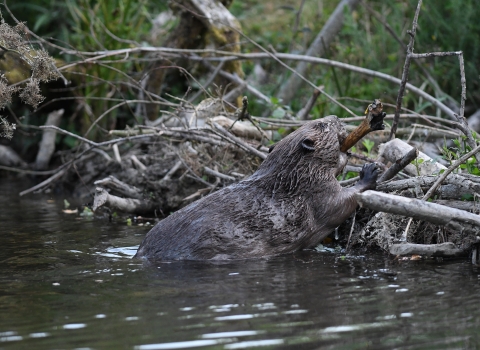In Devon, Kent, Scotland and other areas of the UK, Wildlife Trusts have been leading the way in bringing beavers back, showing how they can create thriving ecosystems and help us to put nature firmly back on the road to recovery.
Hampshire & Isle of Wight Wildlife Trust would love to see beavers playing their part in creating a wilder future for our two counties and we are actively looking into the possibility of introducing them to the Eastern Yar, at our Newchurch Moors nature reserve. But we need Government to back beavers and we are calling for a beaver strategy, as a part of a greener recovery plan for England.
We have the evidence and expertise:
There is an impressive and ever-growing body of independent scientific evidence showing the incredible benefits that beavers can bring to society by working with nature. These include:
- Improved water quality: Beaver dams slow and filter water, causing sediment and nutrients to be deposited in ponds. This improves the quality of water flowing from sites where beavers are present.
- Land holds more water: The dams, ponds and channels created by beavers increase capacity of land to store water and produce a more consistent outflow below their dams. This can result in less water being released during heavy rainfall (reducing flooding downstream) and more water availability during times of drought.
- Carbon is captured: Beaver wetlands capture carbon, locked up in dams, and boggy vegetation and wet woodlands which are restored.
- More wildlife: Beavers create diverse wetland habitats that can provide a home for a wide range of wildlife, especially aquatic invertebrates which act as a food source for other species.
- People engaged with wildlife: People are fascinated by beavers. The presence of beavers in an area provides an opportunity for people to engage with wildlife, as well as creating a market for nature tourism.
By working alongside farmers, landowners, river users and local communities, Wildlife Trusts have learnt that management is essential if we are to maximise the benefits that beavers provide. We now have a range of carefully honed techniques which can help us do this, which help avoid or minimise any localised negative impacts which might occur. We have gained widespread support for our recommended approaches in Scotland and Devon.
We are also calling on government to provide farmers and landowners with financial support to make space for water and beavers on their land. This will reward those who give up some of their land to benefit communities downstream, which will benefit from lower flood or drought risk and higher water quality.
Craig Bennett, CEO of The Wildlife Trusts, said: “Beavers are proving just what a valuable force they can be in helping to solve the nature and climate crises. Their extraordinary ability to naturalise landscapes, improving them for other wildlife, enhancing water quality and controlling water flow makes them a vital component of a modern approach to land management. People love beavers and their presence has really boosted tourism in the places where they’ve been reintroduced.
“Now it is time to look forward and set out an ambitious vision for the return of these animals. But this must be done properly and thoughtfully, with the right support systems in place. That’s why it is so important that the government publishes its beaver strategy soon.”
Martin De Retuerto, Director of Projects and Services at Hampshire & Isle of Wight Wildlife Trust, said: “This is an incredibly exciting time for bringing beavers back where they belong. Having visited some of the fantastic projects being led by Wildlife trusts in other parts of the country, I have been inspired by the ability of these unassuming river rodents to breathe life back into barren, broken ecosystems. Working with the team of experts at the University of Exeter, we are now pushing forward our plans to bring beavers to the Island, as a vital part of our vision for a wilder Wight. We look forward to a positive response from government to help us achieve this aim.”
Professor Richard Brazier, University of Exeter, said: “The habitat present on the Isle of Wight demonstrates great potential for the reintroduction of beavers, with very few obvious areas of conflict where beavers would be problematic. There is also significant scope for habitat enhancement using beavers, which would deliver a range of benefits or ecosystem services including flood reduction, water quality improvements, water storage and drought alleviation alongside the more obvious positive to all wildlife that thrives when water is brought back to our ecosystems.”
The Wildlife Trusts are gathering public support for an England beaver strategy.


